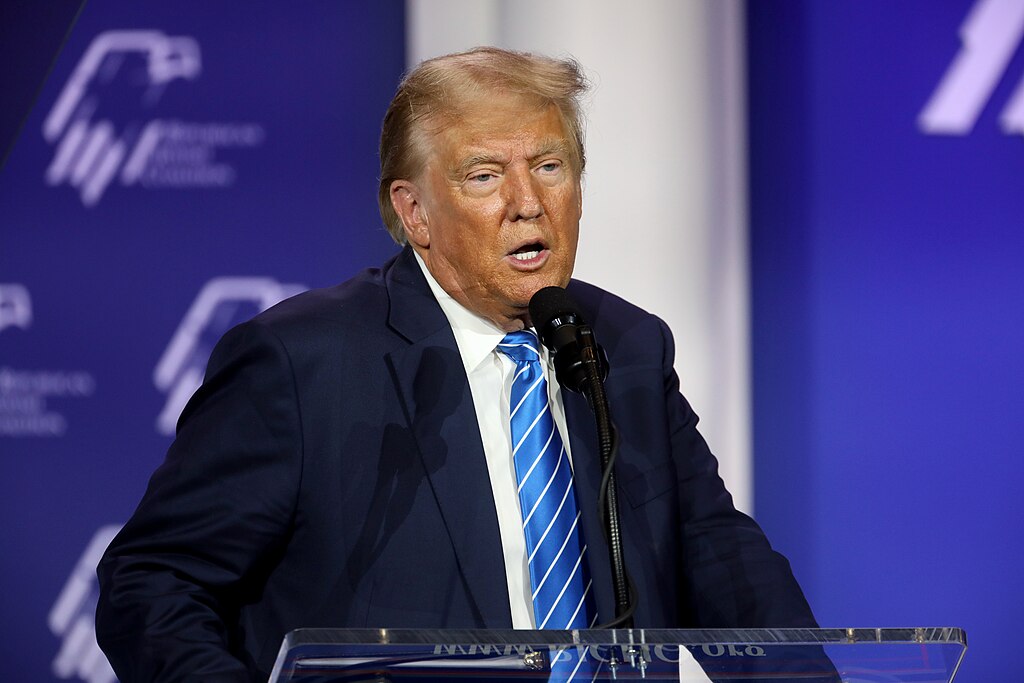As President-elect Donald Trump prepares to reintroduce trade tariffs as a central feature of his political agenda, economists are examining the potential repercussions for global economies, particularly in the Eurozone. While concerns have surfaced about tariffs stoking inflation, Citibank economists suggest that such measures may instead amplify deflationary pressures in an already fragile European economy.
Tariffs and the Eurozone’s Economic Struggles
Citi's analysis posits that tariffs, including a possible 10% blanket duty on European Union (EU) goods, may have negligible direct impacts on inflation within the Eurozone. In a recent note, Citi economists emphasized that imports from the U.S. constitute just over 10% of total euro area goods imports, with energy accounting for a significant portion. Energy, however, is unlikely to be subjected to tariffs. Furthermore, consumption goods from the U.S. represent only 6% of total imported goods, resulting in a limited pass-through effect on the Harmonized Index of Consumer Prices (HICP).
Rather than inflation, the greater concern appears to be the negative implications for economic growth. Citi’s economists predict that a U.S.-EU trade conflict, combined with additional U.S. measures targeting China, could exacerbate existing challenges in the Eurozone's manufacturing sector. The bank has already revised its Eurozone GDP growth projections downward by 0.3%.
“This shock to the already-struggling European manufacturing sector could weigh on employment and wages in the tradeable sector and beyond,” Citi noted. The economists warned that such pressures could ripple across industries, further undermining the Eurozone’s attempts to revitalize growth.
Lessons from the Previous Trump Administration
Reflecting on the effects of tariffs imposed during Trump’s earlier tenure, Citi highlighted significant disinflationary outcomes in Europe. The decline in U.S. reliance on Chinese imports during previous trade disputes, for instance, led to a surge in Chinese import penetration in Europe, a trend that could persist under new tariffs.
While tariffs are likely to reduce U.S. and Chinese demand for Eurozone exports, Citi noted that the Eurozone had benefited in the past from trade diversion, as businesses sought alternatives to Chinese suppliers.
Mixed Reactions and Growing Concerns
Online reactions to the potential tariff policy have been divided. Many expressed skepticism about the broader impacts of Trump's proposed measures:
- @TradeAnalystEU: “Tariffs during a global slowdown? Trump’s playbook could tip Europe into deeper trouble. #EUTrade”
- @US_EconWatcher: “Deflation might be the silver lining Europe needs, but at what cost to growth and jobs? #TariffTroubles”
- @InvestorDaily24: “How much more can EU manufacturers take? Trump’s tariffs could devastate European exports. #TrumpEconomics”
- @PolicyRealist: “Citi’s deflation argument makes sense, but will tariffs deliver long-term stability? Doubtful. #GlobalTrade”
- @EconBuzzGlobal: “Let’s not forget: tariff wars rarely end well. Europe should brace for the worst. #TradeWars”
- @EurozoneInvestor: “Citi’s predictions are alarming. Deflation may not be the savior policymakers think it is. #EconomicPolicy”
Implications for Policymakers
Citi’s forecast underscores the complexity of managing trade policies during a period of economic uncertainty. As the Eurozone grapples with stagnation, its policymakers face the dual challenge of responding to external shocks while fostering internal recovery. The potential for deflation could provide some temporary relief for consumers but may also discourage investment and exacerbate unemployment in key sectors.



 MOEX Russia Index Hits 3-Month High as Energy Stocks Lead Gains
MOEX Russia Index Hits 3-Month High as Energy Stocks Lead Gains  Israel Launches Fresh Strikes on Iran After Death of Supreme Leader Ayatollah Khamenei
Israel Launches Fresh Strikes on Iran After Death of Supreme Leader Ayatollah Khamenei  Asian Currencies Slide as US-Israel Strikes on Iran Trigger Oil Surge and Risk-Off Rally
Asian Currencies Slide as US-Israel Strikes on Iran Trigger Oil Surge and Risk-Off Rally  Asian Stocks Tumble as US-Iran Conflict Escalates and Oil Prices Surge
Asian Stocks Tumble as US-Iran Conflict Escalates and Oil Prices Surge  U.S. Lawmakers Question Trump’s Iran Strategy After Joint U.S.-Israeli Strikes
U.S. Lawmakers Question Trump’s Iran Strategy After Joint U.S.-Israeli Strikes  Trump Says U.S. Attacks on Iran Will Continue, Warns of More American Casualties
Trump Says U.S. Attacks on Iran Will Continue, Warns of More American Casualties  Israel Strikes Hezbollah Targets in Lebanon After Missile and Drone Attacks
Israel Strikes Hezbollah Targets in Lebanon After Missile and Drone Attacks  Global Markets React as Dollar Surges, Swiss Franc Rallies After U.S.-Israel Strike on Iran
Global Markets React as Dollar Surges, Swiss Franc Rallies After U.S.-Israel Strike on Iran  Iran Supreme Leader Ayatollah Ali Khamenei Killed in Israeli, U.S. Strikes: Reuters
Iran Supreme Leader Ayatollah Ali Khamenei Killed in Israeli, U.S. Strikes: Reuters  HHS Adds New Members to Vaccine Advisory Panel Amid Legal and Market Uncertainty
HHS Adds New Members to Vaccine Advisory Panel Amid Legal and Market Uncertainty  AI is already creeping into election campaigns. NZ’s rules aren’t ready
AI is already creeping into election campaigns. NZ’s rules aren’t ready  Argentina Tax Reform 2026: President Javier Milei Pushes Lower Taxes and Structural Changes
Argentina Tax Reform 2026: President Javier Milei Pushes Lower Taxes and Structural Changes  Australia Rules Out Military Involvement in Iran Conflict as Middle East Tensions Escalate
Australia Rules Out Military Involvement in Iran Conflict as Middle East Tensions Escalate  Suspected Drone Strike Hits RAF Akrotiri Base in Cyprus, Causing Limited Damage
Suspected Drone Strike Hits RAF Akrotiri Base in Cyprus, Causing Limited Damage  Russia Signals Openness to U.S. Security Guarantees for Ukraine at Geneva Peace Talks
Russia Signals Openness to U.S. Security Guarantees for Ukraine at Geneva Peace Talks  Stock Market Movers: Dell, Block, Duolingo, Zscaler, CoreWeave, Autodesk, Rocket, MARA
Stock Market Movers: Dell, Block, Duolingo, Zscaler, CoreWeave, Autodesk, Rocket, MARA  Germany and China Reaffirm Open Trade and Strategic Partnership in Landmark Beijing Visit
Germany and China Reaffirm Open Trade and Strategic Partnership in Landmark Beijing Visit 































